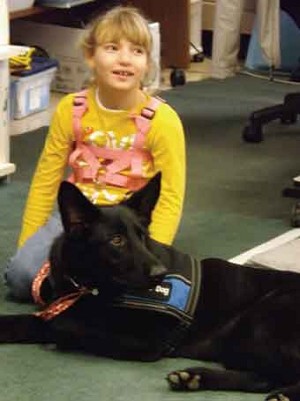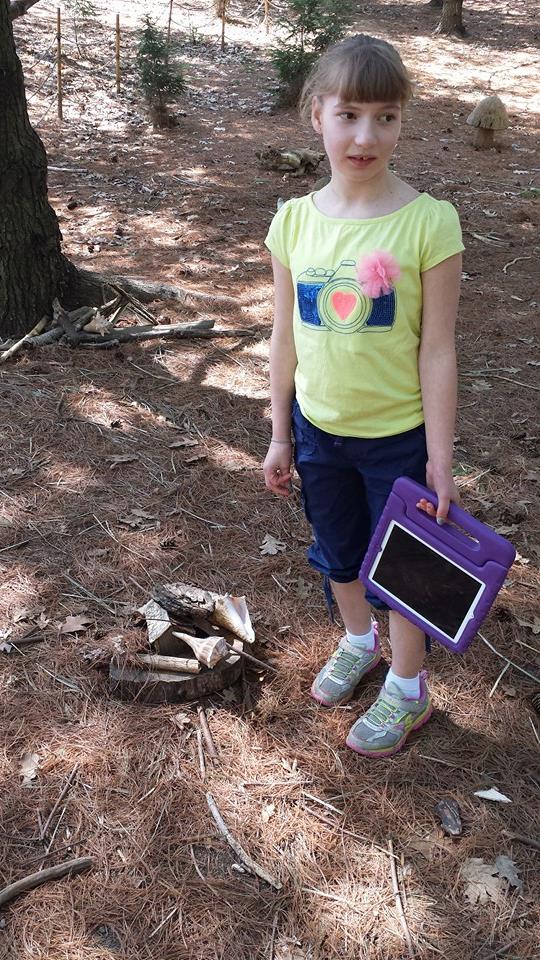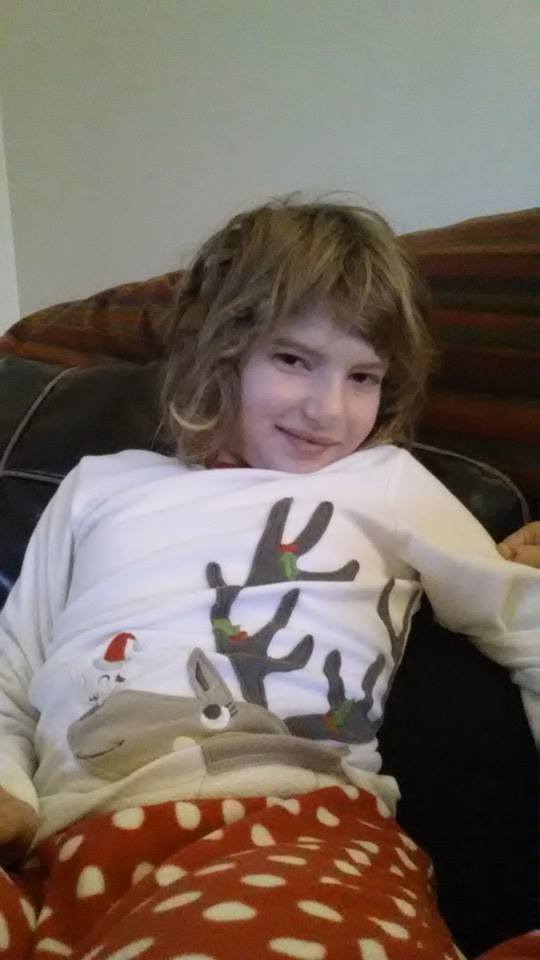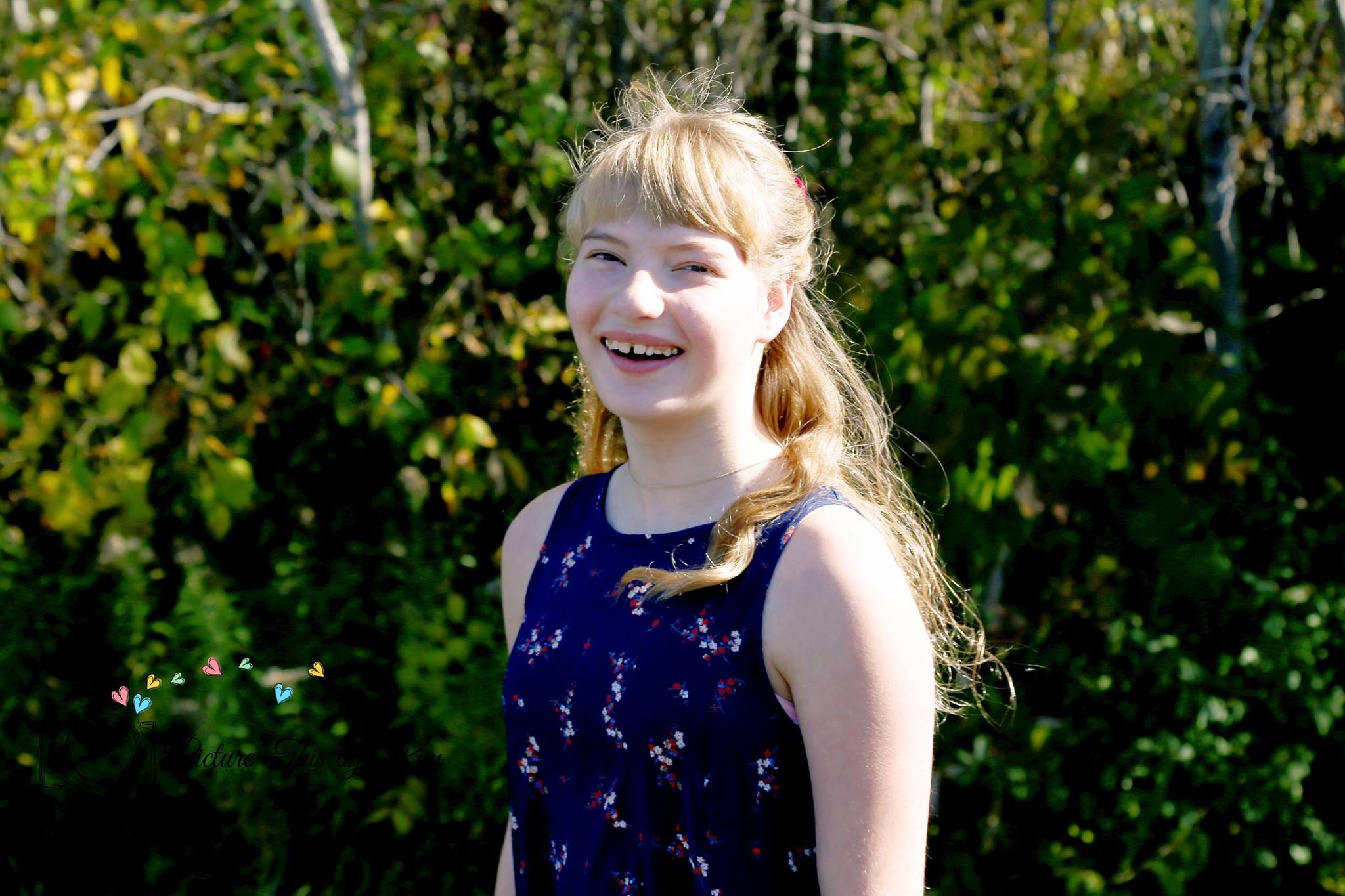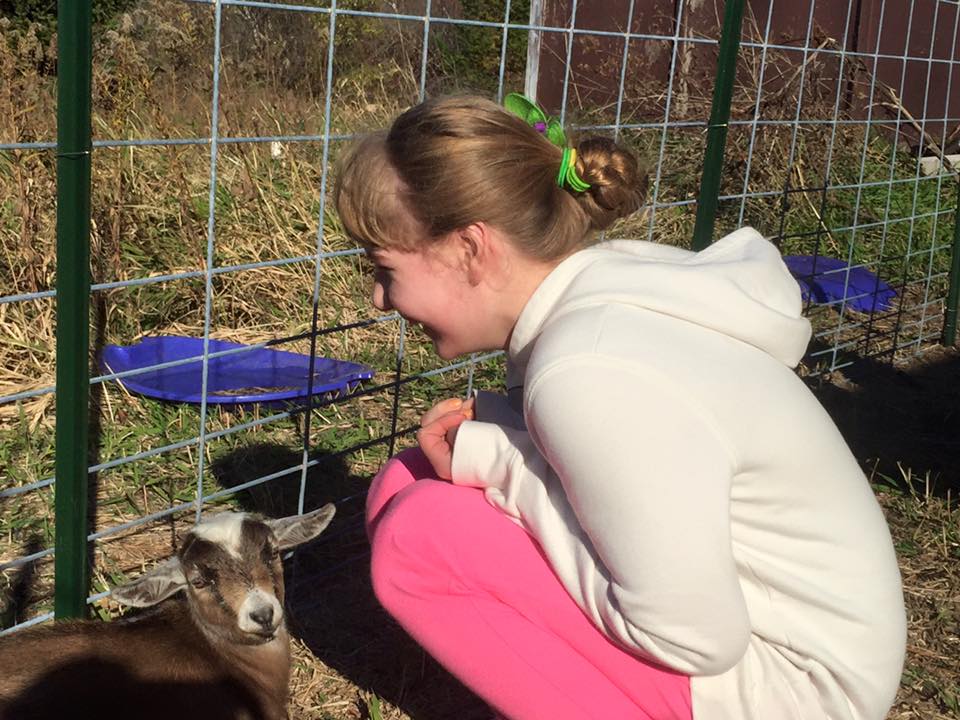Amelia
This is a news article about Amelia and her service dog, Cora.
By Gina Kabat
Fourth grade student Amelia Prigge might not be very talkative in class, but what she is able to accomplish in a day with the help of her service dog Cora speaks volumes.
They have become a dynamic duo. Each day they get ready for school, ride the bus and walk through the doors of Zielanis Elementary School ready to learn and enrich their lives, each in their own ways. Amelia and her companion embark on a friendship in making milestones learning each other's mannerisms, movements, behaviors and means to communicate. Like two new best friends, they enjoy each other's company even if they do not have much to say with words.
Diagnosed with 22q13-a type of deletion syndrome affecting a portion of a chromosome-since the age of 4, Amelia's needs require her to have speech therapy as well as adaptive regular and special educational classes that are level appropriate. For most of her childhood, her methods of indicating a need have been uniquely her own, as with many children recognized on the autism spectrum. Her verbal skills are at a plateau to a level where she can use some sign language and an electronic reader.
Additionally, her ability to disassociate with levels of danger or adverse situations requires Amelia to need constant supervision. As Amelia grows older, her ability to function independently will require the relationship of a service companion to alert her and bring attention to immediate needs, dangers or behaviors. For Amelia, having Cora beside her brings a sense of calm and comfort. Cora's ability to sense danger or to alert Amelia when she is not behaving appropriately is a top priority.
Stepping in to protect
Cora will position herself between Amelia and perceived danger. "She has already demonstrated this," Amelia's mom Rebecca said. Cora has already kept Amelia from running away from the school building and approaching large bodies of water. At just one year old, this stealthy, steadfast black German Shepherd's training began almost immediately after she was a puppy to help others in the world of healing and service.
"Amelia made very little eye contact and did not sit up like other babies when she was nine months old," her mother Rebecca stated. "I knew something was different."
At that time, doctors administered skills tests and other behavioral procedures to diagnose Amelia's condition. What she has is rare but treatable and within the realm of a fully productive and meaningful life, according to her diagnosis. Her efforts to learn and adapt have been commendable since her formal diagnosis. Amelia's needs place her on the autism spectrum with additional in-house, after-school therapy as well.
For many years, Amelia would attend horse therapy at Rhythm Therapeutic Riding in Plymouth and developed a relationship with the owner. Despite the loss of financial funding made available to Amelia's family at a county level to further attend the horse ranch, owners wanted to see Amelia continue with the healing effects of animals.
"Cora is a blessing," mom said. Through the kindness and generosity of The Midwest Council for Children with Disabilities (MCCD) and their organizers, Cora was placed in their lives at no charge to the family. A group of small business owners wanting to provide financial assistance to children challenged physically, developmentally or cognitively founded the Midwest Council for Children with Disabilities in 1997. MCCD provides families of these children the means to pursue medical treatments and therapies that are not covered by health insurance.
A lot of support from school
Amelia has attended Zielanis Elementary School since first grade. "We are overwhelmed by the support and positive foundation all of the administrators, teachers and students have provided us," Rebecca stated. When Rebecca informed the school Amelia was going to receive a service dog, many steps were involved in the process. "They took action right away and welcomed Cora and informed the students," Rebecca added.
"We started talking to the school about the possibility of a service dog a few years ago. Since we found out Cora was coming Chris and I had a meeting at school with Dawn Mueller, Mr. Ramminger and Mr. Propson. As we got closer to her arrival the students were informed, the fourth grade parents were informed and we continued communication between school and home. Amelia's teachers were involved in a conference call with the dog trainer in California, and we had another family from the community do a presentation to the class about service dogs since they also have one," Rebecca recalled.
Staff and administrators took the lead early on. A considerable amount of planning was involved in preparing for Cora's arrival. "We wanted to ensure everyone was informed and were able to make appropriate decisions in knowing Cora's responsibilities," School Psychologist Dawn Mueller said. Planning began last spring, when Amelia's mother informed school that Cora was being trained and would be available as Amelia's service dog sometime in the fall. Rebecca kept the school staff informed over the summer months regarding the progress Cora was making in her training.
This is the first time in Zielanis' history a service dog walks the halls with an enrolled student. "Once school started and there was a known arrival date for Cora, a letter was sent home to all parents of fourth grade students informing them of Cora's arrival date at school, her purpose, and asking them to communicate with school if they had questions or if their child had health concerns or allergies for which we would need to accommodate," Dawn added.
Rebecca gave written consent for the school to provide the information necessary to all the fourth graders and their parents, as well as all of the students at Zielanis to prepare them for a service dog.
Presentation helps pave the way
On Oct. 12, Jana and Tom Gierke-Kiel residents who have their own service dog-provided a presentation to all the fourth grade students about their service dog and what their service dog's role was in supporting Tom because of his disability. Tom and Jana also shared with the kids what their role needed to be once Cora arrived at school.
Students were informed that Cora was working while at school and that she could not be played with or petted. All of the students at Zielanis were provided information about Cora at the Oct. 22 Monday morning meeting. Mr. Propson and Mr. Ramminger shared information about Cora and Amelia and all of the students were told about Cora's job while she was at school. The following Monday, Oct. 29, all of the students were introduced to Cora at the Monday morning meeting. "The students at Zielanis have been wonderful in knowing not to touch Cora while at school," Dawn said.
Typically, Amelia sits at her desk in Mrs. Schneider's classroom with a special writing tablet and the assistance of her paraprofessional Emily Bushman. She is more involved in her classroom activities among students. Cora knows she is in working mode but allows herself the luxury of lying in the floor beside her best friend. There is a gentle stillness about these two. The tether between them gives them enough room to be comfortable yet gently aware they need each other.
The school staff has observed Amelia to be more calm and confident. She is more cooperative, some said. She is also more willing to interact with other students and staff. Overall, she seems happier. Amelia is also more willing to try difficult or new tasks concerning the academic tasks she is expected to complete. Her ability to transition between tasks and the different environments at school (e.g., from the classroom to recess or phy ed, etc.) has improved.
Collectively, all of Amelia's teachers and those involved with the process are hopeful Cora will help in providing for a successful transition for Amelia to the Middle School and for any other changes in her life in the future.
At home, their rural country setting allows for a scenic image of their children getting off the school bus, but instead of the family dog waiting patiently roadside for the kids, she's right there with them. Rebecca and her husband Chris try to keep things normal at home. When the kids get off the bus, it's just like many family scenes; homework, dinner, dishes and the family dog laying underneath the table. In many respects, Cora may feel like her workday is done. She relaxes a bit after her vest is off. This is her down time and Amelia is aware she will be concentrating on her tasks with in-home autism therapy soon.
Nervous at first, but it's fine
"I am very glad our family was given the opportunity to allow Cora to be with Amelia at school. I was very nervous at the beginning, but with the continued support and communication between the staff and myself, we have been able to make this adventure for Amelia a success thus far. Having a service dog will allow Amelia to be so much more independent and so much safer in the outside world. No more being strapped into strollers or in shopping carts wherever we go. We are excited to watch the two of them develop together and I cannot wait to see what lies for them in the future," Rebecca said.
"Some of the changes we have noticed in Amelia is she seems to take responsibility of things now. We ask her to take Cora's leash and she does. She also feeds Cora every afternoon once she gets home from school and does so willingly. She seems much more laid back and less impulsive," Rebecca added. "We took a walk for the first time ever this past weekend without Amelia having to be in a stroller. She used to run off and go wherever she wanted in the past. Now with Cora she is tethered and can walk along side us."
Although Cora has only been with the family since the latter part of October, she has made a wealth of friends in her new environment. It could be said Cora is the new kid in class and assimilating well. Cora's presence in the school has also helped the other children realize not everyone is the same in this world. Everyone is different and has different needs. "Amelia cannot express her needs or her thoughts; we only hope Cora makes it a little easier for her," Rebecca said.
For Amelia and her companion Cora, together they keep learning. They keep each other in check, they speak a non-verbal language, and for them, this might be the best lesson of all.
